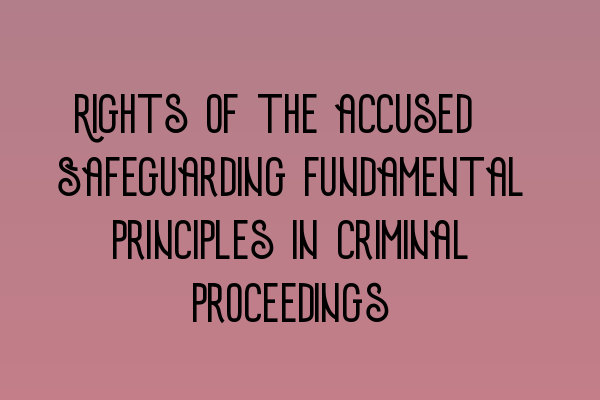Rights of the Accused: Safeguarding Fundamental Principles in Criminal Proceedings
When it comes to criminal proceedings, one of the most crucial aspects is ensuring the rights of the accused are safeguarded. These fundamental principles not only protect the accused from any form of injustice but also ensure that the justice system operates in a fair and impartial manner.
Presumption of Innocence
The cornerstone of criminal proceedings is the principle of presumption of innocence. This principle states that every individual is presumed innocent until proven guilty beyond a reasonable doubt. It emphasizes that the burden of proof lies with the prosecution to prove the guilt of the accused.
By upholding the presumption of innocence, the criminal justice system ensures that no person is wrongfully convicted or subjected to unjust punishment. It also encourages a thorough and meticulous examination of the evidence before reaching a verdict.
Right to a Fair Trial
Another essential right of the accused is the right to a fair trial. This right encompasses several important elements, including:
- Right to Legal Representation: Every accused person has the right to legal representation. This ensures that they have a competent lawyer who can provide advice, guidance, and protection of their rights throughout the proceedings.
- Right to Be Informed: The accused has the right to be informed of the charges brought against them. This includes the nature of the offense, the evidence presented, and the possible consequences.
- Right to Confront Witnesses: A fair trial guarantees the accused the right to confront and cross-examine witnesses brought against them. This allows for a robust and thorough examination of witness testimony, ensuring its reliability.
- Right to Silence: The accused has the right to remain silent during the trial. This safeguards against self-incrimination and prevents any coercion or pressure to provide evidence against oneself.
These rights are fundamental in maintaining a fair trial process that respects the dignity and rights of the accused.
Protection Against Illegal Searches and Seizures
The rights of the accused also extend to protection against illegal searches and seizures. This principle ensures that law enforcement authorities adhere to strict guidelines when obtaining evidence. Any evidence obtained unlawfully, such as through an unconstitutional search, may be deemed inadmissible in court.
By protecting individuals from unreasonable searches and seizures, the justice system ensures that evidence is obtained through lawful means, preventing any violations of an individual’s privacy rights.
Conclusion
In criminal proceedings, upholding the rights of the accused is crucial to maintaining a fair and just system. The presumption of innocence, right to a fair trial, and protection against illegal searches and seizures are all fundamental principles that safeguard the accused from any form of injustice or abuse of power.
At SQE Criminal Law & Practice Law UK, we prioritize the protection of these rights and ensure that our legal professionals defend and advocate for the accused with utmost dedication. To learn more about the SQE exams, check out our related articles:
- SQE 1 Practice Exam Questions
- SQE 1 Practice Mocks FLK1 FLK2
- SQE 2 Preparation Courses
- SQE 1 Preparation Courses
- SRA SQE Exam Dates
Feel free to explore these articles and contact us for any further information or legal assistance.
